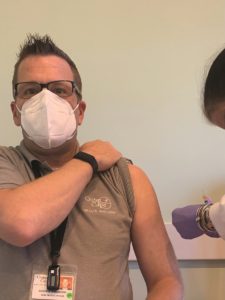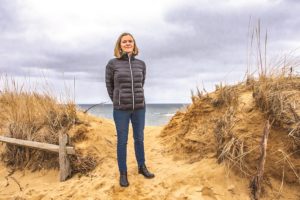PROVINCETOWN — Dr. Andrew Jorgensen received a much-hoped-for gift just before Christmas this year, in the form of an initial dose of the Moderna Covid-19 vaccine. He’s on track for the second and final dose later this month.
“I have the chills just talking about it,” he said.
Jorgensen, chief medical officer for Outer Cape Health Services, spends half his time on administrative tasks and the other half seeing patients at the Provincetown Community Health Center, where he and fellow staff risk coming in contact with the novel coronavirus every day.
“You assume every patient can have Covid, so you’re taking precautions,” Jorgensen said.

In the run-up to the holidays, staff at Outer Cape Health centers in Provincetown, Wellfleet, and Harwich Port were eagerly awaiting a delivery of the vaccine. As health-care workers, they would be among the first to receive it on the Outer Cape.
“It was like waiting for Santa Claus,” the chief medical officer said.
When a box arrived Monday, everyone assumed that it was the vaccine, only to find it contained gloves and needles.
“We thought the vaccine would arrive on Tuesday,” Jorgensen said, but the day passed without a delivery.
“We were ready when we got the vaccine on Wednesday, and started administering it within a few hours,” he said. Each of the three Outer Cape Health centers received a box with 10 vials of vaccine. Each vial contained 10 doses, for a total of 100 shots per center.
Jorgensen was inoculated in Provincetown.
“It felt like a tetanus shot,” he said, noting that you should expect your arm may hurt for a day or two. “The first night, I would roll over and that arm would wake me up, but it made me smile, because I knew the pain was from the vaccine.”
Many of his colleagues had no reaction at all from the first inoculation. “The worst I heard was a swollen hand — someone’s engagement ring got a little tight,” Jorgensen said.
Some staff did turn down the shot. Jorgensen said most of them wanted to wait a couple of weeks to see the reaction of colleagues who were inoculated.
“Part of our position is not forcing anyone,” Jorgensen said.
But Jorgensen had no doubt about his decision to receive the vaccine. As chief of the medical staff, he had carefully reviewed the studies. “I had a pretty good understanding of how the vaccine was developed and the safety measures taken during testing,” he said.
Asked whether he felt relief on being inoculated, Jorgensen said “relief” was not the right word. “We have many serious months ahead, and people will continue to die,” he said. “I also have a little bit of guilt because I got the vaccine, but my husband won’t have it for a long time.”
Under the phased process for vaccination, younger people with no health factors that put them at high risk will likely have to wait until late spring or even summer.
Jorgensen called the rollout a highly significant moment.
“It’s the first day in the process of ending the pandemic,” he said. “For me, it’s a reaffirmation of a sense of hope.”
A Wellfleet Nurse Is Thankful
Marcia Peaslee may not work in the emergency room or intensive care center at Cape Cod Hospital, but as a nurse practitioner, she still has contact with possible Covid carriers every day. She and her co-workers at Cape Cod Healthcare’s Infectious Disease Clinical Services in Hyannis were inoculated with the Pfizer vaccine three weeks ago.
Peaslee, who lives in Wellfleet, is scheduled to get the second shot this week.
She received the initial shot at Cape Cod Hospital at 5:45 on a Thursday morning, as Cape Cod Healthcare worked long hours to get the vaccine into the arms of all their staff.

“Shots were being administered from 5 a.m. until 8 or 9 at night,” she said.
Physically, Peasley said, the shot was no big deal. “All I had was a sore arm,” she said. The only staff member in her office to turn down the shot was a woman who is currently breast-feeding.
The emotional impact of the injection was much bigger. The last several months have been a “roller coaster of anxiety,” Peaslee said. “It’s been terrible on so many levels: physically, socially, emotionally, and financially.”
Now, she’s optimistic. “I was thankful about being able to be vaccinated so early on, and for the peace of mind it gives me,” she said. “This is no small thing. I realize that many people will have to wait possibly months for the same opportunity.”
One big question on the Outer Cape is whether enough people will get vaccinated to achieve vaccine-induced “herd immunity.” That may be a challenge, considering the immunization rates found among kindergartners here in recent years: as previously reported by the Independent, they are among the lowest in the state.
In 2019, for example, only 77 percent of the kindergartners at Wellfleet Elementary School had been fully inoculated against such diseases as hepatitis B, measles, mumps and rubella, polio, and chicken pox. At Eastham Elementary, only 83 percent had received a full series of vaccines.
For diseases like measles, herd immunity is achieved only if 95 percent of the population has been inoculated.
According to the National Institutes of Health’s website, herd immunity from Covid will be achieved only if 75 to 80 percent of a community’s population is inoculated. Other scientists have placed the threshold even higher.
Peaslee hopes people will choose to get the shot.
“Certainly, a lot of people are anti-vaccine, and this is a new vaccine,” Peaslee said. But, she said, “I also talk to a lot of people who say, ‘Sign me up.’ They understand getting Covid is a lot more dangerous than getting the vaccine.”
Peaslee said she is convinced the vaccine received adequate scrutiny.
“I really reviewed the study data and the trials,” she said. “A lot of people were in the trials. I don’t think they compromised the process. I think they just cut through some of the red tape.”



